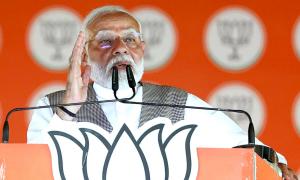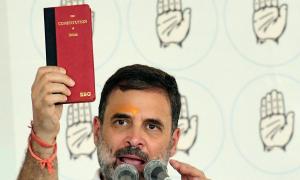In this age of fierce competition, colour television manufacturers are trying everything to boost their sales. Come the Cricket World Cup or the Olympics, manufacturers launch TV sets with new features or upgrade their products or resort to the time-tested schemes of offering discounts or freebies.
If this does not help, then try out exchange schemes. Such marketing tactics were adopted by almost all the manufacturers of CTVs in India. The central government was quick to realise that such schemes dented its revenue collections and, therefore, in the year 1998 notified televisions to be taxed under the MRP scheme.
Since as per the definition of 'retail sale price' laid in section 4A, price was required to be sole consideration for sale, in all cases where 'price was not the sole consideration,' these goods were not valued in terms of section 4A but are charged to 'specific rate' depending on screen size of the television.
Further, as per notification no. 5/98 C.E, dated 02.06.1998, Sr.no. 229, where the retail sale price is declared on the package at the time of clearance from the factory of production, such CTVs are subject to duty @18% advalorem. In other cases, CTVs were subjected to duty on specific rates depending upon screen size.
However, since valuation with reference to the 'retail sale price' was causing uneasiness to the manufacturers, they tried to bypass this concept by adopting novel ideas and novel arguments.
Sony India Ltd was no exception. During the period July 1, 1998 to January 31, 1999, Sony India cleared some models of CTVs manufactured by paying the central excise duty at specific rates depending upon their screen sizes. It also did not affix the retail sale price when the goods were cleared from the factory but affixed the same at their depots before these sets were offered for sale in retail.
The Commissioner of Central Excise, Delhi-III initiated proceedings against the company seeking valuation of the said goods in terms of section 4A and seeking recovery of central excise duty to the tune of more than Rs 20 million.
While finalising the proceedings he observed that the company was clearing CTVs on payment of specific rate of duty with the sole intention of paying lesser duty. He also negatived the contention of the party that supplying of free VIP suitcases, cordless head phones and video CD title along with the CTVs, did not render price as the sole consideration for sale.
These proceedings were finalised and equivalent penalty was imposed in terms of section 11AC and interest in terms of section 11AB of the CEA'44.
In appeal before the CEGAT, the company contended that since they were offering free gifts with each CTV to the consumers, the price was not the sole consideration for sale and therefore, their case would not fall in the 'retail sale price' clause of the notification and they have correctly paid duty on screen sizes of the CTVs under the clause 'other cases.'
They also contended that they had acted bona fide and hence had paid duty on specific rates. Further, they paid the duty even before the same was confirmed by the commissioner and hence no penalty is imposable.
The CEGAT while rejecting the appeal vide final order no. 488/2000-A, dated 12.06.2000 had held that:
In terms of sub-section ( c) of section 2 of the Indian Contract Act, 1872, the person making the proposal is called the "promisor" and the person accepting the proposal is called the "promisee". Sub-section (d) of this Section defines "consideration" as something or act which promisee does at the desire of the promisor. Therefore, the term "consideration for sale" is what passes from the buyer to the seller and not the other way round. As such, not withstanding the offer of free gifts by the appellants to the buyers on the sale of CTVs, the sale price charged from the buyers will not cease to be the sole consideration for such sale. As such, it was mandatory for the party to print the MRP on the package at the time of clearance from the factory as per the requirement of the Standards of Weights and Measures Act, 1976, and it is the sole consideration for sale.
The stock transfer is not sale of goods, actual sale of goods took place from their depots and when the goods were sold they were having printed retail sale price on the packages. This printed retail sale price was the sole consideration for sale of the goods and the Central Excise duty was leviable @18% advalorem on the CTVs.
It is not in dispute that the printing of MRP on the package of CTVs is mandatory under the provisions of the Standards of Weights and Measures Act, 1976 and the appellants should have printed the MRP on the packages before clearing the goods from the factory. In order to bypass the rigours of the legal provisions relating to the MRP-based payment of duty, they postponed the printing of the MRP before the clearance from the factory premises to the depots. The legal provisions brook no doubt in their interpretation and the intention to evade duty appears manifest in the act of the appellants not printing the MRP on the packages before removal from the factory despite clear legal provisions. Therefore, the extended period of demand of duty and the penal provisions under Section 11AC and interest under Section 11AB have been rightly invoked. Aggrieved by the above order of the CEGAT the company filed an appeal (Appeal (Civil) no. 4964 of 2000) before the Supreme Court, but without any success.
The Apex Court in its judgment dated 05.05.2004 has while upholding the order of the CEGAT and dismissing the appeal held that:
"From totality of the circumstances and the nature of transaction conducted by the appellant, the view taken by the Tribunal that the stock transfer from their factory to their depots would not amount to sale of goods and actual sale of goods took place from their depots and when the goods were sold they were having printed retail price on the packages and also that the sale price charged from the buyers was the sole transaction notwithstanding there were free gifts that had been offered thus stands to reason and does not call for our interference."
While justifying the imposition of penalty and interest in terms of Section 11AC and 11AB of the CEA'44, the Supreme Court has held that:
"The decisions adverted to by the learned counsel have different complexions and bearing. These cited cases arose in the circumstances where certain actions had been taken in bona fide belief or the parties were under bona fide doubt as to under what tariff item they had to pay tax in question or where the assessee was under bona fide belief that his company was not required to be registered as dealer under the Sales Tax Act."
"In the present case, earlier the appellant was paying duty at the rate of 18% ad valorem on the maximum retail price. It is only after 2.6.1998 a change was sought by the appellant by not printing the price on the packed goods by removing the same to their depots from their factory in order to claim that the packed goods had not been priced at the time of their removal from the factory and gifts were offered by the appellant to indicate that the consideration in the sale transaction was not solely the price. These factors, we think, were rightly taken note of by the authorities and the penalty imposed need not be considered in the present proceedings.''
(See full text of judgement in '2004-TIOL-43-SC-CX' in Legal Corner)








More from rediff